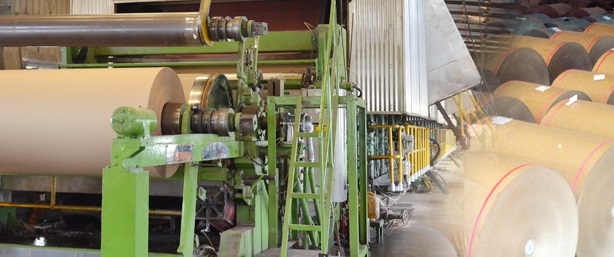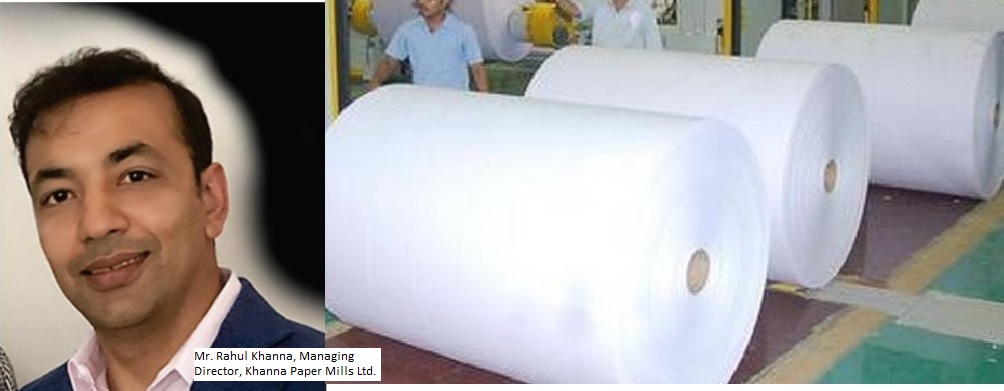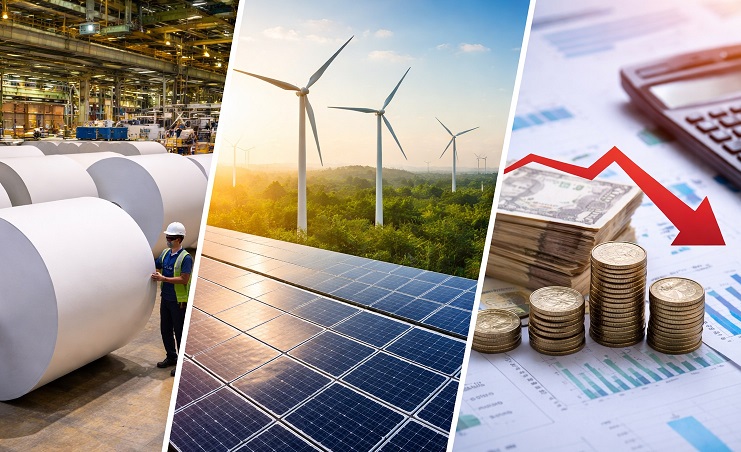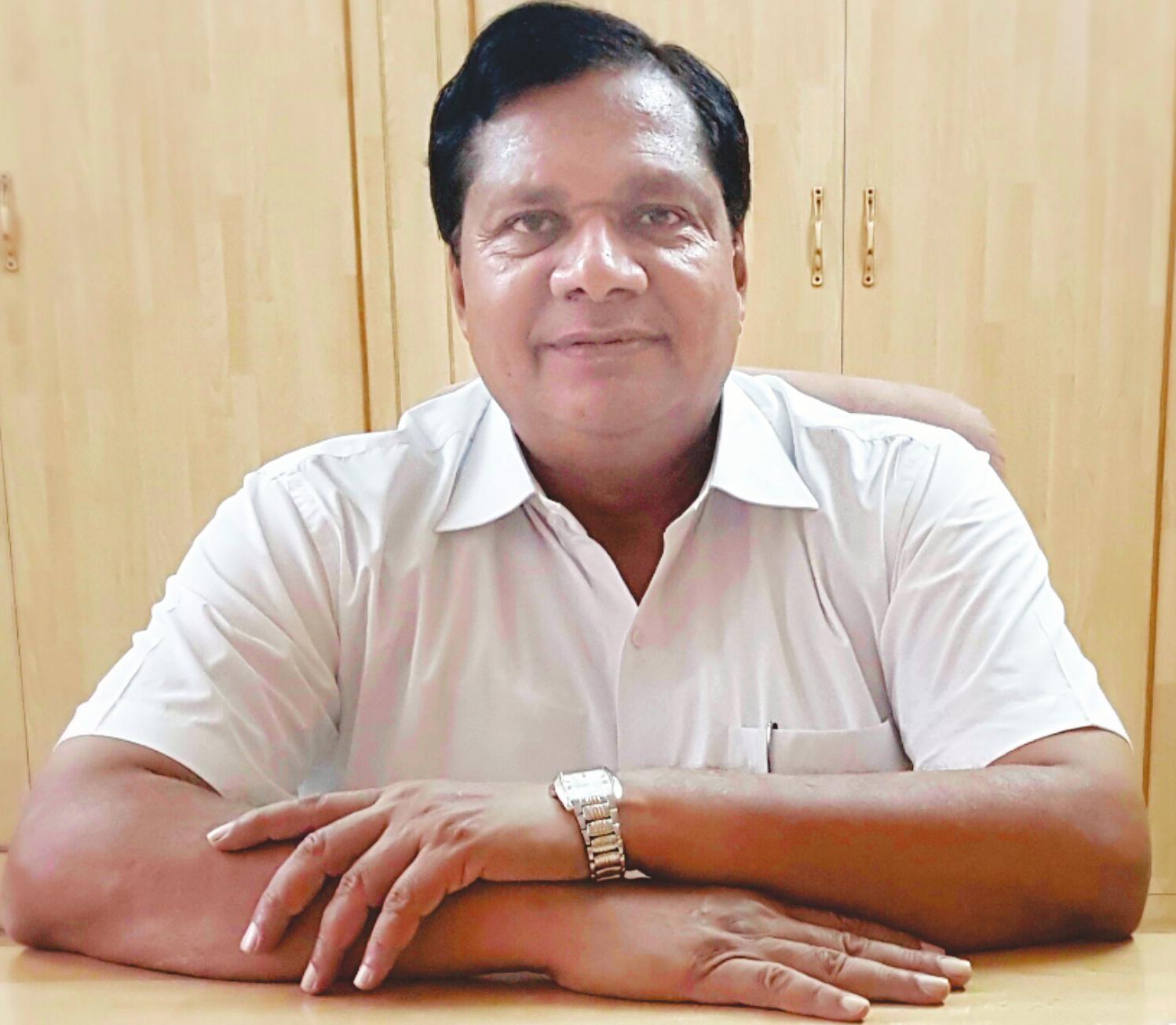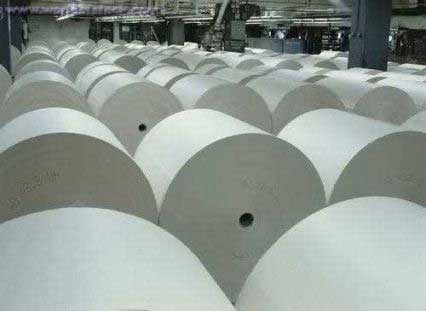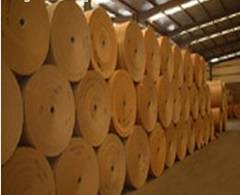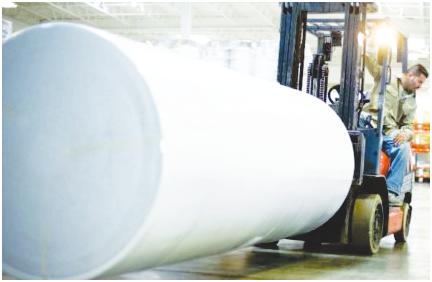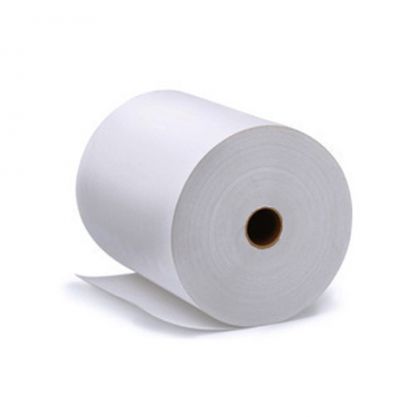"Kuantum Papers is strategically investing in advanced paper coatings to meet the evolving needs of food, FMCG, and e-commerce packaging,” says Mr. Pavan Khaitan of Kuantum Papers
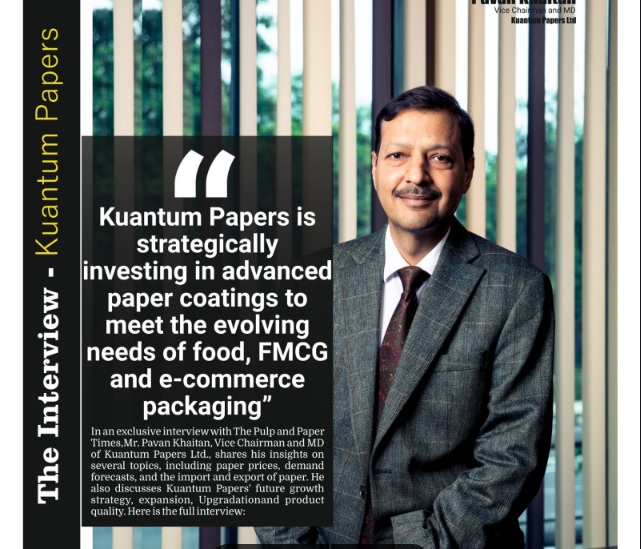
"Kuantum Papers is strategically investing in advanced paper coatings to meet the evolving needs of food, FMCG, and e-commerce packaging,” says Mr. Pavan Khaitan of Kuantum Papers
-Kuantum Papers’ strategic upgrade of all four paper machines aims to meet the soaring demand for high-quality paper in India and worldwide, enhancing output to 675 TPD
-we are actively scaling up production capabilities and expanding our product portfolio in eco-friendly packaging solutions
-Whether it’s high-performance packaging, premium printing materials, or eco-friendly alternatives, our goal is to cater to niche segments that offer better profitability
-Kuantum Papers is making significant strides in the packaging segment by developing barrier-coated papers
In an exclusive interview with The Pulp and Paper Times, Mr. Pavan Khaitan, Vice Chairman and MD of Kuantum Papers Ltd., shares his insights on several topics, including paper prices, demand forecasts, and the import and export of paper. He also discusses Kuantum Papers’ future growth strategy, expansion, Upgradation and product quality. Here is the full interview:
The Pulp and Paper Times:
Q: Please give a brief introduction to Kuantum Papers Ltd. (KPL) and its business journey.
Kuantum Papers is a leading paper manufacturer, specialising in high-quality Agro and Wood based Maplitho, Copier, Specialty and Creamwove papers.
With over four decades of experience in paper making, we have remained at the forefront of product and process innovations, while upholding the highest standards of excellence and sustainability. Starting with a small footprint of 30 TPD in 1980 on 2 paper machines, we have grown strength to strength to the current capacity of 450 TPD, and plans are already afoot to take the operations forward to 675 TPD on the existing 4 paper machines.
The extensive portfolio of writing and printing paper finds a good standing in a variety of usages, and our diverse range of specialty products cater to a wide array of unique and specific uses.
At the heart of our operations lies a resolute commitment to a sustainable business model, with environmental responsibility serving as the guiding principle across all processes. Driven by this principle and the quest for innovation, we have developed a range of specialty products that reduce dependence on single-use plastics, nurturing a greener tomorrow.
Beyond core business operations, we are committed to empowering and uplifting communities, with a focus on education, health and hygiene, and rural development. We provide a supportive, inclusive and inspiring environment for our employees, enabling them to drive innovation, efficiency and customer satisfaction. Moving forward, our strategic vision entails building production capacities to higher levels, thereby strengthening our position as one of the best and professionally managed “Green Companies” in the paper industry.
Q: How do you evaluate the current state of the WPP and specialty paper markets for our readers?
The Writing & Printing Paper (WPP) and specialty paper markets are evolving due to sustainability trends, digitalization and shifting consumer preferences. While the WPP segment remains stable with demand from education, government and corporate sectors, challenges persist with rising raw material costs and cheap imports. However, the increasing adoption of eco-friendly, recycled and agro-based paper is driving innovation. Meanwhile, the specialty paper market is expanding rapidly, particularly in packaging and food-grade papers, fuelled by e-commerce and regulatory shifts toward sustainability. Though cost pressures remain, product diversification and efficiency improvements present strong growth prospects.
Q: Kuantum Papers has been implementing various strategic initiatives to improve efficiency and reduce costs. Could you shed some light on these strategic steps?
In a competitive industry like ours, it’s crucial to remain agile and proactive in identifying areas where we can improve efficiency while managing costs effectively. By utilizing agro-residues like wheat straw and bagasse for paper production, and rice husk as a fuel in our boilers, our company minimizes reliance on expensive raw materials and mitigates environmental concerns such as stubble burning. This not only reduces input costs but also supports local farming communities.
The first major cost-saving initiative came with the implementation of the Mill Upgradation Plan, with a focus on Backward Integration which helped us synchronize operations, leading to improved quality and output. Secondly, we are advancing towards a Mill-wide Artificial Intelligence Plan, embedding AI-based modules into our operations to enable predictive maintenance, real-time analytics and intelligent process control, ensuring we stay ahead of industry advancements.
Then our TG4 Upgradation has increased power generation by 15% without additional steam consumption, contributing to greater energy efficiency. Enhancements in our Paper Machines, including upgrading PM1’s capacity from 22 TPD to 50 TPD and installing Hood and False Ceiling Systems, have further streamlined production. To improve pulp quality, we have commissioned a Chip Washing System, effectively removing dust and sand from veneer waste chips.
Sustainability remains a core focus of our strategy. We have transitioned from groundwater to a surface water supply system, complete with a dedicated treatment plant, ensuring responsible water usage. Further improvements in effluent treatment include the addition of a tertiary clarifier, enhancing the efficiency and reliability of our wastewater management processes.
With a clear vision for the future, Kuantum Papers remains dedicated to automation, process optimization, and sustainability, ensuring that we continue to lead the industry in efficiency and responsible manufacturing.
With an aim to build a more sustainable and future-ready organization, we continue to invest in automation, process optimization and sustainable sourcing to drive long-term cost efficiency and responsible manufacturing.
Q: KPL has approved a mill expansion project with an investment of INR 735 crores, which is progressing as per schedule, with some project supplies and installations already completed. Could you elaborate on this expansion and how it will enhance KPL’s competitiveness in the market?
This is one of the most significant milestones in Kuantum’s journey. The investment of INR 735 crores allows us to scale up our manufacturing capabilities to meet the rising demand for high-quality paper, both in India and globally. The main component of this initiative is the upgradation and modernisation of all our existing four paper machines, with prevalent technologies, thereby enhancing the output to 675 TPD and marking a 50% rise in capacity.
The expansion includes pulp mill upgrades with an advanced wood cooking system to optimize energy use and ensure a more efficient and consistent pulp supply while debottlenecking existing infrastructure to meet future market demands. Additionally, we are looking to enhance paper machine technology by integrating a Shoe Press, Film Size Press, Top Wire Installation, Dilution Headbox and an Oil-Heated Calendar Section, which will significantly improve production efficiency and paper quality. The company is diversifying its product range, introducing coated and specialty grades to cater to the evolving needs of the high-value specialty paper segment.
In line with our commitment to sustainability, we are upgrading our 200 TPD recovery boiler by replacing the Cascading Heat Recovery System with an economizer, enhancing ESP systems, and installing a new lime kiln to improve fuel efficiency, increase steam generation and reduce emissions, ensuring environmental compliance. Furthermore, the company is expanding its Clonal Propagation Center over the next few years to produce 1 crore saplings annually, reinforcing sustainable raw material sourcing and supporting afforestation efforts.
By augmenting production capacity and integrating advanced technologies, we aim to meet the growing demand in the paper industry more effectively. The emphasis on sustainability and environmental responsibility is expected to enhance the company's reputation and appeal to environmentally conscious consumers. Collectively, these initiatives position Kuantum to strengthen its market presence and competitiveness.
Q: Most top A-grade mills recorded a decline in revenue and net profit in Q3 FY25 due to rising pulp & raw material costs and cheap imports, including high wood costs. How do you foresee revenue and profit growth in the coming quarters?
The decline in revenue and net profit for Top A-grade mills in Q3 FY25 was primarily driven by rising pulp and raw material costs, expensive wood procurement and increased competition from cheap imports. However, the outlook for the coming quarters indicates a gradual recovery, backed by strategic cost optimizations, operational efficiencies, market growth opportunities, and diversification into high-margin specialty papers.
Mills are actively focusing on process automation, captive energy generation and sustainable raw material sourcing to mitigate cost pressures. The increasing demand for sustainable and value-added paper products, such as barrier-coated and food-grade packaging papers, is also expected to boost profitability.
On the export front, Indian paper exports have seen significant growth in recent years, and with shifting global trade dynamics, there is an opportunity to expand market share in regions like MENA. As a result, a combination of cost efficiency measures, trade regulations and a strategic product mix is likely to improve revenue and profit margins in H2 FY25 and beyond.
Q: A trend is emerging in the industry where a few A-grade mills in India have significantly reduced their reliance on virgin wood fiber by increasing the use of recycled paper. Do you think high wood costs and cheap imported paper are the reasons behind this shift?
It’s a combination of both. High wood costs and competitive pressures from cheap imports have certainly pushed mills to explore alternatives. However, sustainability is playing an equally important role in this shift. The global move towards responsible manufacturing is no longer just an industry trend, but an expectation from consumers, regulators, and businesses alike.
At Kuantum, we have long recognized the importance of sustainable sourcing, which is why we have steadily increased our use of agro-based raw materials. To further mitigate high wood costs, we are expanding our Social Forestry Program, aiming to plant one crore high-yield, fast-growing saplings over the next two years. These saplings will be supplied to local farmers, creating a sustainable supply chain while positively impacting their livelihoods.
As regulations tighten and consumer awareness grows, companies that prioritize sustainable practices will have a competitive edge. We see this shift as a necessary evolution—one that will define the next phase of growth for the paper industry in India and beyond.
Q: We believe that KPL is exploring newer sections of the packaging segment, such as barrier-coated papers. Could you shed some light on this and the expected developments in the future?
Kuantum Papers is making significant strides in the packaging segment by developing barrier-coated papers that offer bio-barrier and moisture-resistant solutions as a sustainable alternative to plastic packaging. With increasing global regulations against single-use plastics, including India's plastic ban, the company is strategically investing in advanced paper coatings to meet the evolving needs of food, FMCG and e-commerce packaging. By collaborating on innovative coatings, we aim to improve paper functionality, making it a viable replacement for plastic-based packaging.
The Indian sustainable packaging industry is projected to grow at over 7% CAGR, presenting a substantial market opportunity. To capitalize on this demand, we are actively scaling up production capabilities and expanding our product portfolio in eco-friendly packaging solutions. These advancements not only strengthen our market presence and competitiveness but also align with our long-term vision of driving sustainability in the paper industry.
Q: The U.S. has imposed a 25% tariff on imports from Canada and Mexico. Do you anticipate that paper mills in Canada, China, and Mexico will seek new export markets, such as Southeast Asia or India, in response to these tariffs? How do you see this tariff war will shape the Indian paper industry?
The tariff changes will undoubtedly push mills in Canada, Mexico and even China to explore alternative markets. India, being one of the fastest-growing economies with an evolving demand for paper products, is likely to see an increase in imports as these mills look for new trade routes. However, this influx of foreign paper, especially if it’s priced competitively could put pressure on domestic manufacturers, particularly in the unorganized sector.
Having said that, India’s paper industry has been steadily strengthening its position, focusing on quality, sustainability and innovation. While imports may increase competition, they also present an opportunity for Indian mills to differentiate themselves through superior product offerings and localized solutions. Additionally, policy interventions such as anti-dumping duties or quality control regulations, may help balance the impact of foreign imports on domestic producers. Ultimately, the companies that invest in efficiency, cost management, value-added products and tap on the local connect, will be best positioned to navigate this evolving trade dynamic.
Q: Environmental, Social, and Governance (ESG) has become a major buzzword in the sustainability space. What does ESG mean to KPL, and how are you integrating sustainable business practices into your operations?
In an era where responsible growth is paramount, we are committed to embedding ESG (Environmental, Social and Governance) principles into every aspect of our operations. On the environmental front, we drive sustainability through large-scale afforestation initiatives. Our Clonal High-Tech Nursery produces 40 lakh plants annually, with a target of growing 1 crore plants per year to cover 12,500 acres of plantation. To conserve water, we have reduced freshwater consumption by 2,500 m³/day through advanced filtration and recycling technologies, with ongoing projects aiming for an additional 5 m³/tonne reduction. Our Co-Generation Power Plant and high-pressure CFBC boilers ensure energy efficiency, reducing reliance on grid power.
Socially, Kuantum is deeply invested in community welfare. We run a high school for 400 students, support 350 Anganwadi children and provide free medical checkups for 2,000 villagers on a regular basis. We are helping ameliorate the health standards of the nearby town and villages by supporting the facility of doctors at the hospital in the region. The hygiene issues are being addressed holistically through our rural initiatives, which include enhanced sanitation by laying sewerage pipelines and installing sewage treatment plants in the surrounding villages, as well as laying of a road network in them. Solar lights have been installed in a number of villages, encouraging renewable energy adoption.
Governance is at our core, with stringent compliance, transparency, and ethical standards. In line with international frameworks such as the OECD guidelines and the UN guiding principles, we are intensifying efforts to reinforce our commitment to human rights. This entails strengthening due diligence procedures, providing comprehensive human rights training to employees and conducting thorough onsite assessments to identify and address potential risks.
Q: Market oversupply is expected to continue in FY25 and FY26, as market growth is lagging behind the capacity additions by domestic and international mills. How will you protect your margins in the face of these new capacities?
Market oversupply is always a challenge, but at Kuantum, we see it as an opportunity to sharpen our competitive edge. While increased capacities might lead to pricing pressures, we are focusing on several strategic initiatives to maintain and even improve our margins.
Firstly, product diversification is key. By expanding our portfolio into specialty papers where demand is growing and margins are higher, we are reducing our dependence on commoditized paper products. Whether it’s high-performance packaging, premium printing materials, or eco-friendly alternatives, our goal is to cater to niche segments that offer better profitability.
Secondly, cost optimization remains a priority. Through process automation, energy efficiency improvements and strategic raw material procurement, we are continuously working on lowering our production costs. Further, investments in waste management contribute to our long-term cost competitiveness.
Most importantly, embracing Artificial Intelligence (AI) is a key milestone in our journey toward future readiness. As Mark Cuban aptly put it, “Artificial intelligence, deep learning, machine learning—whatever you’re doing if you don’t understand it—learn it. Because otherwise, you’re going to be a dinosaur within three years.” Essentially, we have taken effective steps to ensure that we don’t fall into a trap from where retrieval is difficult. By integrating AI-driven process optimization, predictive analytics and smart manufacturing, we are enabling a far better tomorrow for ourselves.
Q: Is there any message you would like to convey to the Indian paper industry?
The Indian paper industry is at a pivotal moment. While challenges such as raw material costs, imports and market oversupply persist, the sector also has immense opportunities. The shift towards sustainability, the rise of eco-friendly packaging and the demand for high-quality paper products present a strong growth trajectory.
To stay ahead, we must collectively focus on innovation, efficiency and sustainability. Investing in advanced technology, adopting circular economy practices, and exploring new markets will be crucial for long-term success. More importantly, as an industry, we must work together to create a robust ecosystem that not only supports growth but also ensures environmental responsibility.
Our aim should not just be about producing more; it’s about producing better and staying relevant. And by embracing this philosophy, we can build a stronger, more resilient industry that thrives in the years to come. After all, our paper industry is a wonderful source of inspiration to many.
Web Title: "Kuantum Papers is strategically investing in advanced paper coatings to meet the evolving needs of food, FMCG, and e-commerce packaging,” says Mr. Pavan Khaitan of Kuantum Papers




 Join WhatsApp Group
Join WhatsApp Group Join Telegram Channel
Join Telegram Channel Join YouTube Channel
Join YouTube Channel Join Job Channel (View | Submit Jobs)
Join Job Channel (View | Submit Jobs) Join Buy Sell Channel (Free to Submit)
Join Buy Sell Channel (Free to Submit) Paper News Headlines Channel (Free to read)
Paper News Headlines Channel (Free to read)



